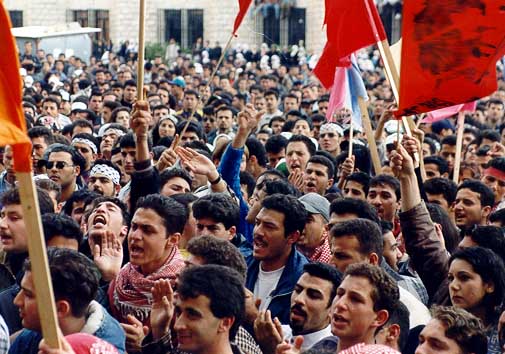
This year's Birzeit student council elections saw the pro-Fatah Jerusalem Bloc attaining a narrow percentage, although not overall majority, of 22 seats over the Islamic Bloc's 20. The 1997 results of the two largest parties closely echoed those of 1995, proving last year's results - when the Jerusalem Bloc secured only 17 to the Islamic Bloc's 23 seats - to be an aberration.
This university election result is always awaited with anticipation and trepidation, as in the years before the arrival of the Palestinian Authority, Birzeit was seen as a barometer for Palestinian public opinion, one result of the university's secular foundation and student body drawn from the breadth of Palestinian society.

The surprising 1996 results reflected the student Fatah faction's internal conflict at the time, over the nature of its relationship with the Palestinian Authority. This past academic year, Fatah have been very careful to distance themselves from the PA and emphasise democratic values, with former student council president Ibrahim Khreisha, leader of the 1996 Fatah revolt, returning to assist with the campaign strategy of this year's Jerusalem Bloc.
Other factors that upset the barometer in 1996 were a disastrous Palestinian Authority raid of An-Najah University's campus in the weeks before the election, and early reaction to the presence of students working for Palestinian security forces on the university campus. This year, no similar focus on PA activities affected the student consciousness, instead a profound sense of collective national threat from Israel's powering ahead with the Har Homa project in East Jerusalem.
With a student - from the pro-Fatah student bloc no less - shot dead by Israeli bullets only two weeks before the elections, there was no distraction from the fact that June this year marks the thirtieth year of Israeli occupation of the West Bank and Gaza Strip. For those whose memories were longer, the elections took place on the same day - 9th April - as the Deir Yassin massacre in 1948.
This year's theme for the elections was, "The democratic tradition continues," a reflection of the fact that these student elections are somewhat of an institution here in Palestine. Every year, the 51-seat student council parliament is chosen in open, democratic elections, under a proportional representation system. This year, Birzeit's elections were the only to take place without formal Palestinian Authority observers, felt by the university administration to be a necessity in order to preserve the independence of the voting system.
The focus on Birzeit's elections still remains, necessitating the first ever special election website (http://www.birzeit.edu/scouncil/elections/), although the media frenzy that used to accompany them has faded away. Another focus was noted this year, as the eyes of national parties fell on the three left-wing student blocs, who formed the first-ever left coalition, the Progressive Democratic Student Pole. In 1995 and 1996, the left-wing parties noted a decline in their support from 12 to 11 seats, or 23 to 20 percent. This year, the newly formed Pole gained only 8 seats, or 16 percent.
Some student commentators attribute the left's failure to preserve its share of the vote from last year to the late forming of the coalition. More daring commentators attribute the loss to the worsening political situation and the undermining of the peace process. "With a loss of hope," said one, "extremes arise. Is the choice before us really one between two polarities?"
The only other two competing blocs were small, a pro-Islamic bloc named after "the Martyr Fathi Shaqaqi" and a decidedly anti-party political bloc, associated with Palestinian-American returnees, called "Changes". Fathi Shaqaqi Bloc took one seat, Changes none, that latter conceding defeat with a post-election leaflet decrying the lack of focus on "student issues".
While we rejoice in the success of this model of Palestinian democracy, we cannot but remember that this festival of independent Palestinian decision-making offers no immediate answers to the worsening situation outside the campus gates. That which is being sowed in this classroom of democracy, has many years to lay dormant, before we will see its harvest.
This article first appeared on the 1997 Student Council Elections Website/P>